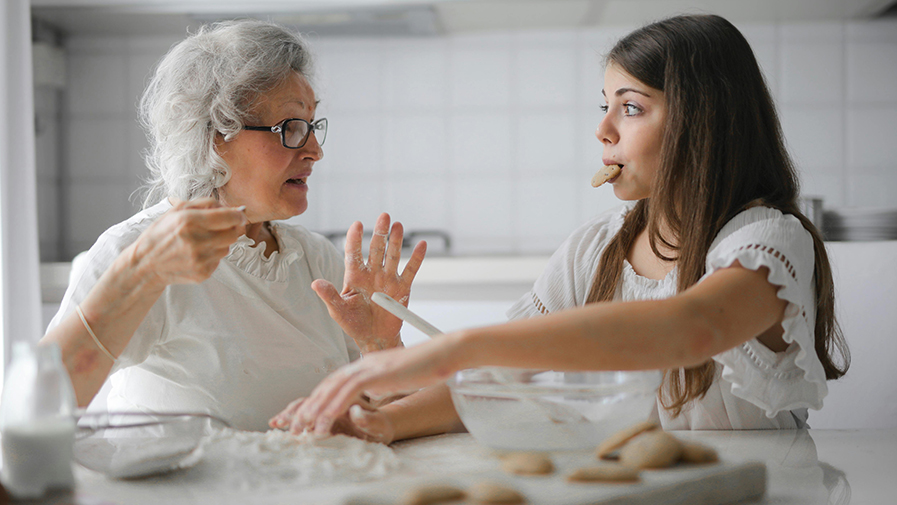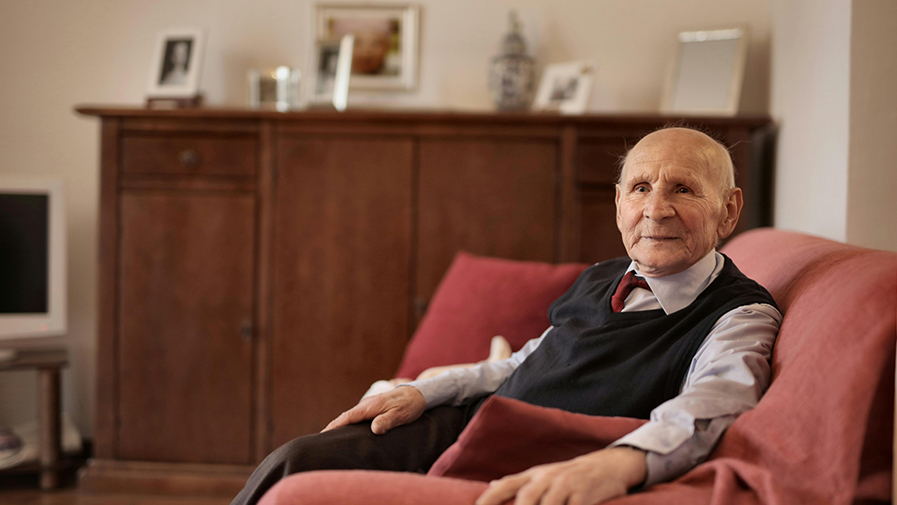
Caring for a loved one at home can be rewarding but also challenging. At Bluebird Care, we want to provide our community's family caregivers with the information they need to provide safe and meaningful care.
Here are some helpful tips and guidance to make the experience more manageable and beneficial for both the caregiver and the person receiving care.
Every individual’s care needs are different – so this article is only a guide. For personalised advice, contact our team at Bluebird Care Bournemouth and Poole today.
1. Learn About Care and Your Loved One’s Specific Needs
It’s crucial to educate yourself about your loved one's medical conditions and specific needs to provide the best care at home.
Understanding the nuances of their health issues enables you to offer better care and anticipate potential problems before they arise. Start by consulting with healthcare professionals to get a comprehensive overview of your loved one’s condition, treatment options, and necessary lifestyle adjustments. Additionally, delve into reputable online resources, medical journals, and books to deepen your knowledge.
Taking the initiative to learn essential caregiving skills is equally important. Enrol in online courses that cover a wide range of topics, from basic first aid and medication management to specialised care techniques for chronic illnesses or disabilities.
Local workshops and seminars can provide hands-on experience and direct access to experts who can answer your questions. Support groups, both online and in-person, offer a platform to share experiences, gain practical advice, and receive emotional support from others who understand the challenges of caregiving.
By equipping yourself with knowledge and skills, you can approach caregiving with confidence and competence, ensuring your loved one receives the highest quality of care possible.
2. Create a Safe Environment
Creating a safe and accessible environment is essential for your loved one's well-being. This is achievable at home with some simple yet effective modifications. Here are some things we recommend to our customers at Bluebird Care Bournemouth and Poole.
Start by assessing the home for potential hazards and making necessary modifications to improve safety and accessibility. Install grab bars in the bathroom, add ramps where needed, and place non-slip mats in areas prone to moisture.
Ensure that pathways are clear of clutter to prevent falls and that furniture is arranged to allow easy movement, especially if your loved one uses mobility aids like walkers or wheelchairs. Proper lighting is also crucial; ensure all areas of the home are well-lit to prevent accidents, particularly at night.
In addition to physical modifications, it's important to ensure that medications and potentially harmful substances are stored safely out of reach, especially if cognitive issues are a concern. Regularly review the home environment for new hazards and make adjustments as needed. By creating a safe and comfortable living space, you can significantly reduce the risk of accidents and enhance your loved one's independence and quality of life.
3. Establish a Routine
A consistent daily routine can provide comfort and stability for your loved one, making it easier to manage their care.
Develop a schedule that includes regular times for meals, medication, exercise, and rest. Having a predictable routine can help reduce anxiety and confusion, especially for individuals with cognitive impairments. While maintaining consistency, it's important to remain flexible and adapt the routine to meet your loved one's changing needs and preferences.
Involve your loved one in planning the routine as much as possible, allowing them to retain a sense of control and independence. Include enjoyable activities that cater to their interests, whether it's reading, watching favourite TV shows, or engaging in hobbies. A well-structured day can provide a sense of normalcy and purpose, contributing to overall well-being.
4. Health and Hygiene
Maintaining health and hygiene is a fundamental aspect of caregiving. Assist your loved one with daily personal care tasks, such as bathing, grooming, and dressing, while encouraging them to do as much as they can independently. Respect their dignity and preferences during these activities to make them feel comfortable and respected. Regular hygiene care is vital to prevent infections and maintain overall health.
Managing medications is another critical component. Ensure medications are taken as prescribed by organising them using pill organisers and setting reminders for dosage times. Keep a detailed record of all medications, including dosages and schedules, to avoid missed or incorrect doses. Regularly consult healthcare providers to review and adjust medications as needed, ensuring the best possible outcomes for your loved one's health.

5. Be Aware of Nutrition and Hydration
Proper nutrition and hydration are vital for maintaining your loved one's health and energy levels. Plan and prepare balanced meals that meet their dietary needs and preferences, taking into account any medical conditions that may require specific dietary restrictions or modifications. Consulting with a dietitian can provide personalised guidance on meal planning and nutrition.
Encourage regular fluid intake throughout the day to prevent dehydration, which can lead to serious health issues. Offer a variety of fluids, such as water, herbal teas, and juices, and incorporate water-rich foods like fruits and vegetables into their diet.
Monitor their intake and watch for signs of dehydration, such as dry mouth, confusion, and decreased urine output. By ensuring proper nutrition and hydration, you can help your loved one maintain their strength and overall well-being.
6. Ensure Adequate Emotional Support
Providing emotional support is just as important as meeting physical needs. Keep open lines of communication with your loved one, actively listening to their concerns, feelings, and needs.
Validate their emotions and offer reassurance, creating an environment where they feel heard and understood. Emotional support can significantly impact their mental and emotional health, reducing feelings of loneliness and anxiety.
Encourage social interaction by facilitating visits with family and friends or engaging in community activities. Social connections can provide a sense of belonging and improve mood. Additionally, explore activities that your loved one enjoys and can participate in, such as hobbies, games, or creative pursuits. Engaging in meaningful activities can boost their emotional well-being and provide a sense of purpose and joy.
And remember, you must look after yourself too. So always prioritise your emotional, physical, social, and mental health – and take breaks if you need them.
7. Stay Active with Regular Exercise
Regular physical activity is essential for maintaining physical and mental health. Encourage your loved one to engage in exercises suited to their abilities, such as walking, stretching, or light strength training. Physical activity can improve mobility, reduce the risk of chronic diseases, and enhance overall well-being.
Of course, every person’s movement abilities are different, and it’s important to complete exercise that is safe and suitable for your loved one.
Therapeutic activities, such as physical therapy or occupational therapy, can be beneficial, especially for individuals with specific health conditions. These activities can help maintain or improve physical function and independence. Incorporate exercise into the daily routine, making it an enjoyable and consistent part of the day. Always consult healthcare professionals before starting any new exercise programme to ensure it is safe and appropriate for your loved one's health status.
8. Take Breaks With Respite Care
Caregiving can be physically and emotionally demanding, making it essential to take regular breaks to avoid burnout. Arrange for respite care through family, friends, or community programmes to give yourself time to rest and recharge. Respite care can be provided in various forms, such as in-home care, adult day care centres, or short-term stays in a care facility.
Prioritising self-care is crucial for maintaining your own health and well-being. Ensure you get enough sleep, eat healthily, and engage in activities that you enjoy and that help you relax. Seek support from other caregivers or support groups where you can share experiences and gain advice. By taking care of yourself, you can continue to provide the best possible care for your loved one.
9. Legal and Financial Planning
Proper legal and financial planning can ease the caregiving process and ensure your loved one's needs are met. Keep important documents, such as medical records, legal papers, and insurance information, organised and easily accessible. Having these documents readily available can be crucial in emergencies and for routine medical appointments.
Understand the financial aspects of caregiving, including insurance coverage, benefits, and potential costs. Consult a financial advisor to create a plan that addresses both short-term and long-term financial needs. Explore available resources, such as government programmes and non-profit organisations, that may offer financial assistance or support services. By proactively managing legal and financial matters, you can reduce stress and focus on providing quality care.

10. Seek Support
Caregiving can be a challenging and isolating experience, so it's important to seek support from others. Join caregiver support groups to connect with individuals who understand the unique challenges of caregiving. These groups offer a platform to share experiences, gain practical advice, and receive emotional support.
Utilise community resources and services designed to assist caregivers. These may include meal delivery programmes, transportation services, home health aides, and respite care options. Don't hesitate to ask for help from family and friends; delegating tasks can alleviate some of the burden and provide much-needed relief. By building a strong support network, you can enhance your caregiving capabilities and maintain your well-being.
Need Additional Care Support?
At Bluebird Care, we want the locals in our Bournemouth and Poole communities to access the right care for them. For some, the best person to provide this care is someone in their family. For others, it’s a professional care team like the care experts at Bluebird Care. If you’re looking for care support or personalised advice, don’t hesitate to contact our friendly team today.





